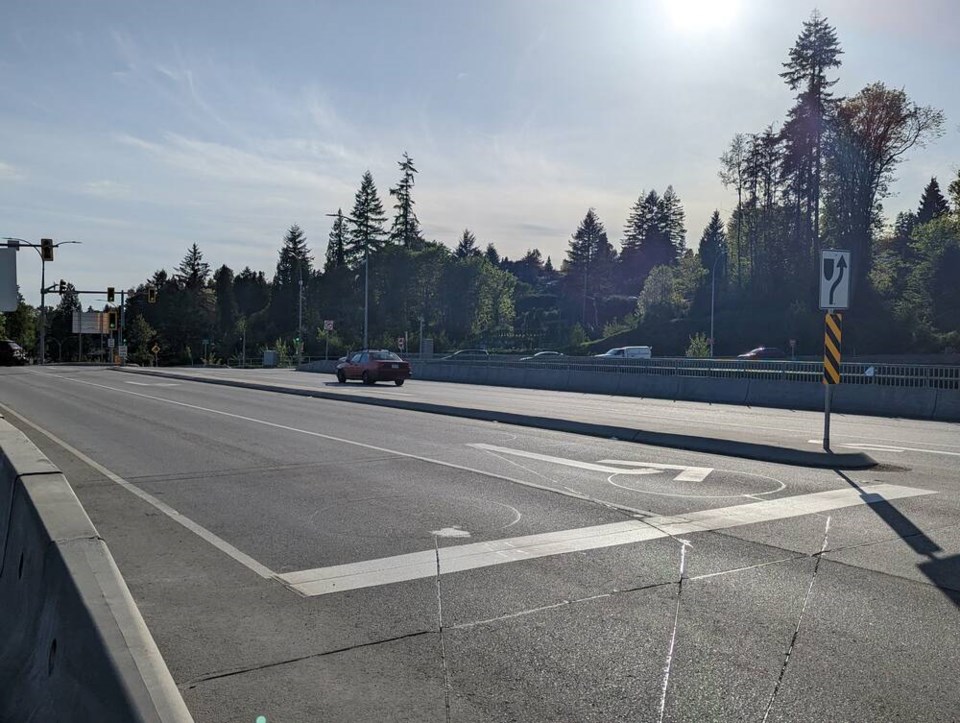The province has escalated its effort to remove a demonstrator group from a North Vancouver overpass, as an injunction has been issued by B.C. Supreme Court banning their activities at the site.
After an application was made by the Ministry of Transportation and Infrastructure – which had previously issued notices for the group to leave, citing violations of the Transportation Act – the court order was granted Thursday, May 11. Laminated copies of the order have been affixed to the overpass.
The Supreme Court injunction prohibits hanging or displaying anything, gathering or occupying, and intentionally obstructing or distracting vehicle or pedestrian traffic. The restrictions apply anywhere on the overpass and the area within 250 metres in either direction along the Trans-Canada Highway. The order also gives police the authority to “arrest and remove” any person violating any provision of the order’s provisions.
Several North Vancouver RCMP cruisers arrived on the overpass at around 2:30 p.m. Thursday, when the group was gathering for its weekly demonstration. As usual, members of the group were displaying signs related to anti-vaccination, government conspiracy, and one reading “Gender Ideology = Child Sex Grooming.” The latter has been denounced by officials as hateful, and set off a chain of escalating actions to remove the group from the area.
No arrests were made on Thursday. North Vancouver RCMP were notified of the injunction around noon that day, just after the application was granted, said Const. Mansoor Sahak.
“Our main objective yesterday was to educate the protesters about the injunction, give them an opportunity to read the injunction [and] be aware of what the court has outlined in there,” he said.
Police negotiated with the group, Sahak said, and they left early around 5:30 p.m., whereas they typically stay until 7 p.m. or so.
Robert Webb, one of the demonstrators, said they were first approached this week by two staff from the Ministry of Transportation, who told the group that there’s a new injunction and that the gathering is unlawful. The overpass group was also confronted by counter-protesters.
Webb said that his group spoke to police and reached a compromise.
“We try to do it when the traffic is going very slow … it’s more intimate that way,” he said. “[An officer] said, ‘Well, how about leaving at 4 or 4:30 p.m.?”
“We compromised at 5 p.m.,” Webb added. “I would normally have stayed a little longer.”
Demonstrator files application for injunction to be set aside
On Friday, Webb filed an application with B.C. Supreme Court to have the injunction order set aside. May 29 is the next available day to be heard in court, Webb said, adding that he’s unsure at this point in time if he’ll be represented by a lawyer. He said he will argue that “the order infringes on my rightful use of public space and a right to free speech."
Regardless of what happens in the courts, Webb said he will continue to demonstrate. “Many of use are prepared to get arrested.”
Going forward, police actions will be dictated by the actions of the protesters, Sahak said.
“We want to enforce the injunction peacefully, educate and take a softer approach. But nevertheless, we have an injunction to enforce, and we have to make sure that it is enforced,” he said.
In a statement, the Ministry of Transportation re-iterated that safety is its No. 1 priority.
“The hanging of banners from any highway overpass is not allowed under the Transportation Act. Further, a court order dated May 11 prohibits people from gathering and the display of signage in the area of the Mountain [Highway] overpass,” reads the statement.
“The ministry expects this order to be respected. Enforcement is the responsibility of police.”




